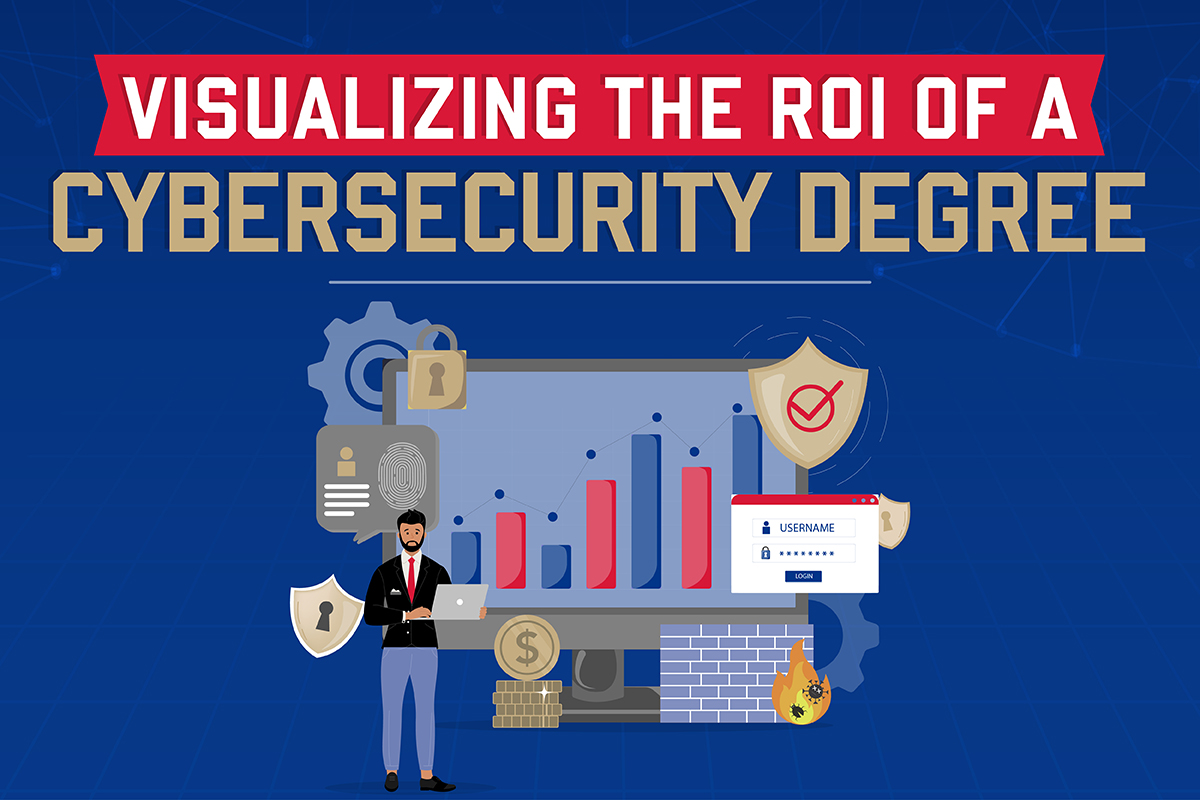Security Operations Defined
Written by:
University of Tulsa
• Aug 8, 2024

The threat of cyber attacks looms over every organization that relies on secure communications and data, with the impact increasing each year.
A recent Apple-commissioned study reported that in the first nine months of 2023, the number of data breaches among U.S. organizations increased by nearly 20% compared with all of 2022. Meanwhile, IBM’s Cost of a Data Breach Report 2023 revealed that approximately 95% of organizations included in the report experienced more than one breach in 2023.
In an age of rising cybercrime, investing in cybersecurity is paramount for all businesses, regardless of their size or industry. A critical aspect of an organization’s cybersecurity is its security operations framework, which encompasses the people, practices, and tools it uses to safeguard sensitive data and infrastructure.
Aspiring security operations professionals can develop the skills they need to help secure an organization’s digital assets by pursuing graduate education in cybersecurity.
What Is Security Operations?
Security operations (SecOps) generally refer to the collaboration between security and information technology (IT) operations within an organization to bolster network, system, and data security. SecOps comprises the policies, procedures, and technologies involved in cybersecurity as well as the professionals responsible for managing it.
In theory, security and IT operations should work in perfect harmony, yet they can sometimes contradict one another. For example, IT operations may emphasize speed and agility when implementing a system update, while security prioritizes rigorous testing and risk reduction. SecOps fosters greater collaboration between security and IT operations, enabling organizations to achieve a crucial balance between operational efficiency and system security.
Organizations with an effective SecOps framework are able to approach cybersecurity proactively, which allows them to more easily identify cyber threats, prevent security incidents, and mitigate the effects of cyber attacks.
Members of a SecOps Team
A diverse team of cybersecurity and IT experts lead security operations. The makeup of a SecOps team can vary, depending on the size of the organization or its industry. Generally speaking, however, it includes the following roles:
-
SecOps Manager: The SecOps manager oversees the team and directs security operations. They may also act as a liaison between the team and the organization’s chief information security officer (CISO).
-
Security Engineers: Security engineers design and manage the organization’s security architecture. This entails evaluating, testing, and implementing various cybersecurity tools and technologies.
-
Security Analysts: Security analysts directly respond to cybersecurity threats and data breaches. They identify and investigate incidents and make efforts to mitigate adverse impacts, including recovering compromised data.
Why Is Security Operations Important?
The cyber threat landscape is constantly evolving, with both the frequency and sophistication of cyber attacks growing at an alarming rate. Cyber attacks powered by artificial intelligence (AI), for example, are an emerging danger.
For organizations that are serious about safeguarding their digital assets, implementing a security operations model is crucial. By promoting a proactive approach to cybersecurity, SecOps improves an organization’s ability to detect threats, prevent security incidents, and respond effectively when an attack occurs. It also facilitates greater collaboration between different teams within an organization, establishing a more cohesive approach to cybersecurity across departments.
Benefits of Security Operations
Establishing a strong SecOps framework can yield numerous benefits for organizations. The most direct benefits include the following:
-
Asset Protection: First and foremost, security operations enable organizations to be proactive in their approach to cybersecurity, helping them identify threats, prevent unauthorized access, and minimize the risk of data breaches. As a result, they’re better equipped to protect systems and networks, sensitive data, and intellectual property.
-
Business Continuity: By reducing the incidence of data breaches and minimizing their impact, SecOps helps ensure that business operations can continue during and after a security incident.
-
Cost Savings: The average cost of a data breach climbed to $4.45 million in 2023, according to IBM — a 15% increase over three years. Taking a proactive approach to cybersecurity by investing in security operations can help prevent cyber attacks as well as mitigate the financial damages caused by a breach.
-
Regulatory Compliance: A responsible SecOps strategy, including effective security measures and proper recordkeeping, can help organizations meet federal and state regulations and industry standards for cybersecurity.
-
Consumer Trust: Organizations that are committed to cybersecurity show that they respect their customers’ privacy, boosting trust and confidence among consumers and stakeholders.
Security Operations Best Practices
Every organization’s approach to security operations will vary depending on their unique needs. However, some fundamental SecOps measures can enhance an organization’s security posture.
Develop a Security Incident Response Plan
Organizations should have a comprehensive plan outlining what actions they’ll take in the event of a threat or a cyber attack, including clearly establishing the roles and responsibilities of individual members of the SecOps team.
Monitor New Threats and Technologies
By conducting research and attending industry conferences, SecOps professionals can stay current on the latest developments in the threat landscape and the security tools at their disposal. This can help them more easily identify threats and prevent security incidents.
Continually Improve by Assessing Incident Response
Organizations must continually evaluate the effectiveness of their security operations using measurable metrics and key performance indicators. Some of the most common metrics used to measure success in incident response include the following:
-
Mean Time to Detect: MTTD measures how long it takes the SecOps team to detect a security incident.
-
Mean Time to Resolution: MTTR measures how long it takes to resolve a security incident once it’s been detected.
-
Mean Time to Restore Services: MTRS measures how long it takes to restore service to users following a disruption caused by a security incident.
Measuring the number of security incidents within a specific time frame and the cost of a security incident are also valuable data points that organizations can use to improve their SecOps strategy.
Become a Security Operations Leader With a Master’s Degree in Cybersecurity
In today’s digital economy, the threat of a cyber attack is omnipresent, and organizations need a robust security operations framework to protect themselves — and their customers and stakeholders — against data breaches and other cyber hazards. A sound SecOps strategy can help organizations detect threats, prevent security incidents, and minimize the damage caused by cyber attacks.
If you’re interested in developing the skills to lead security operations, consider the online Master of Science (M.S.) in Cyber Security program at The University of Tulsa. Our field-experienced faculty will guide you through an immersive learning experience that can position you to serve on the front line of cyber defense.
Find out how TU’s nationally recognized cybersecurity program can help you achieve your professional goals in as little as 20 months.
Recommended Readings
Cybersecurity Architect Job Description
Security Operations Center (SOC) Analyst Salary and Job Description
Cybersecurity vs. Computer Science: Career Opportunities and More
Sources:
Apple, “The Continued Threat to Personal Data: Key Factors Behind the 2023 Increase”
FBI, FBI Warns of Increasing Threat of Cyber Criminals Utilizing Artificial Intelligence
IBM, “What Is a Security Operations Center (SOC)?”
Palo Alto Networks, Security Operations (SecOps)
Splunk, “SOC Metrics: Security Metrics and KPIs for Measuring SOC Success”


